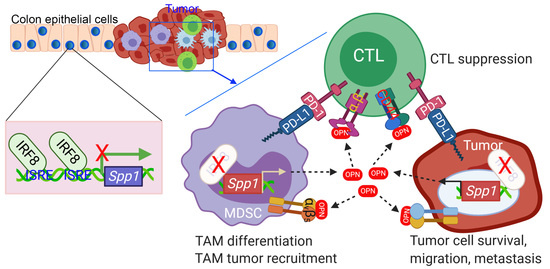Cancers, Vol. 12, Pages 3379: Osteopontin: A Key Regulator of Tumor Progression and Immunomodulation
Cancers doi: 10.3390/cancers12113379
Authors: Hannah R. Moorman Dakota Poschel John D. Klement Chunwan Lu Priscilla S. Redd Kebin Liu
OPN is a multifunctional phosphoglycoprotein expressed in a wide range of cells, including osteoclasts, osteoblasts, neurons, epithelial cells, T, B, NK, NK T, myeloid, and innate lymphoid cells. OPN plays an important role in diverse biological processes and is implicated in multiple diseases such as cardiovascular, diabetes, kidney, proinflammatory, fibrosis, nephrolithiasis, wound healing, and cancer. In cancer patients, overexpressed OPN is often detected in the tumor microenvironment and elevated serum OPN level is correlated with poor prognosis. Initially identified in activated T cells and termed as early T cell activation gene, OPN links innate cells to adaptive cells in immune response to infection and cancer. Recent single cell RNA sequencing revealed that OPN is primarily expressed in tumor cells and tumor-infiltrating myeloid cells in human cancer patients. Emerging experimental data reveal a key role of OPN is tumor immune evasion through regulating macrophage polari zation, recruitment, and inhibition of T cell activation in the tumor microenvironment. Therefore, in addition to its well-established direct tumor cell promotion function, OPN also acts as an immune checkpoint to negatively regulate T cell activation. The OPN protein level is highly elevated in peripheral blood of human cancer patients. OPN blockade immunotherapy with OPN neutralization monoclonal antibodies (mAbs) thus represents an attractive approach in human cancer immunotherapy.



Δεν υπάρχουν σχόλια:
Δημοσίευση σχολίου